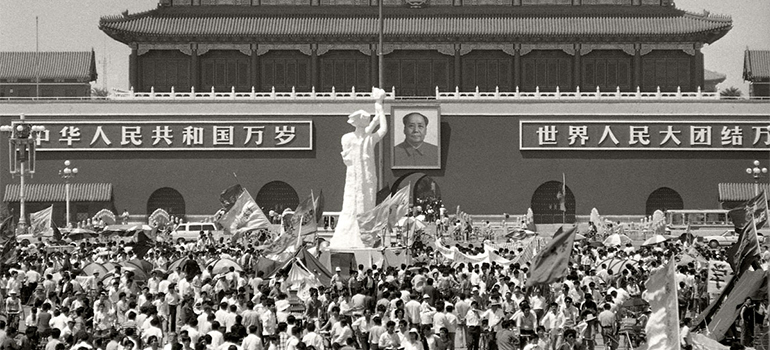On June 4, 1989, Chinese officials began their crackdown on student and popular demonstrations around Beijing’s iconic Tiananmen Square. Twenty-five years later, UBC scholars discuss how the event is perceived today, how it affected China’s political and social development, and what remains of the struggle for greater democratic and human rights in China.
Prof. Pitman B. Potter
Faculty of Law
HSBC Chair in Asian Research
Tel: 604.822.5653
Email: potter@law.ubc.ca
On his memories of the Tiananmen Square crackdown:
I was living and working in Beijing in June 1989. I was teaching at Peking University Law Department and working for an international law/consulting firm. My office and my apartment were in the CITIC Building overlooking a main thoroughfare leading to Tiananmen square. I witnessed directly many of the events leading up to, during and after June 4, 1989.
On how the crackdown on student and popular demonstrations is perceived today:
The event is recalled with sadness and regret by many who experienced it. Although bitterness remains, folks have responded in different ways–rationalizing a crackdown on disorder, writing off the errors of student activism, or simply trying to forget and get on with life. The price of remembering is high, largely because the regime will not permit open discussion of the topic. For most people who came of age after 1989, the event is largely forgotten, due primarily to the regime’s incessant efforts to erase the event from memory and to crack down on those who have tried to remember and understand its significance.
Prof. Diana Lary
UBC Dept. of History
Email: lary@mail.ubc.ca
On her memories of the event:
I was in China in May and early June 1989 on a research trip. I was evacuated from Beijing on the Canadian evacuation flight organized by the Embassy.
The democracy movement was intense and exciting, the crackdown that followed was brutal and tragic. The events and images are seared into the minds of all Chinese old enough to be aware of them at the time. Official amnesia does not work. The democracy movement has not been forgotten, though many people are silenced by fear of the tremendous power of the state. Others, especially in important positions, are embarrassed by the terrible image that the crackdown created abroad and refuse to talk about it.
I am still optimistic. China’s history is long and full of examples where injustices such as the crackdown in 1989 have been rectified.
Prof. Yves Tiberghien
UBC Dept. of Political Science
Institute of Asian Research
Tel: 604.822.4358
Email: yves.tiberghien@ubc.ca
On how it’s affected China’s political and social development:
The event had a large impact. At the elite level, it led to the rise of conservative leaders like Li Peng and the demise of reformists like Zhao Ziyang. It led to a freeze on political reforms for many years. Even now, while we see the rise of deliberation, there is no return to the spirit of democratic reforms that was present in the 1980s.
On what remains of the struggle for greater democratic and human rights in China:
At one level, not much remains. The sense of hope and infinite possibility, the fresh idealism of the mid-1980s is gone. It was the end of innocence and idealism in a way. But some deeper issues of struggling for justice, equality, and anti-corruption remain present. The movement was spontaneous and did not leave any foundation or roots. But it opened a conversation that will need to resume at some point in the future.
